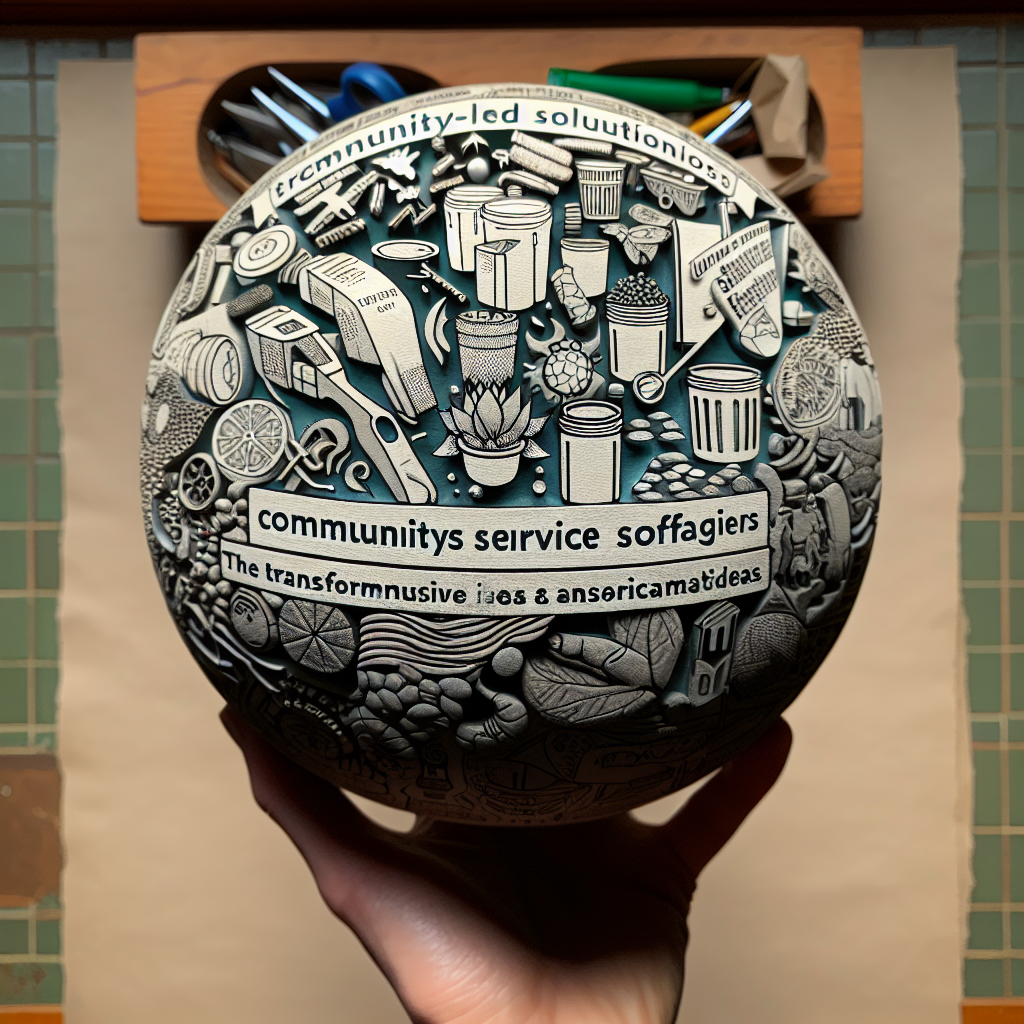In a world heavily reliant on public services for waste management and sanitation, have you ever wondered how individuals cope without these essential amenities? This article explores the innovative methods employed by communities when public services are lacking, highlighting their resourcefulness and determination in maintaining cleanliness and hygiene. From innovative composting techniques to communal waste disposal initiatives, discover the creative ways in which individuals manage waste and sanitation in the absence of traditional public services.

Importance of waste and sanitation management without public services
Ensuring cleanliness and hygiene
Waste and sanitation management play a crucial role in ensuring cleanliness and hygiene in our communities. Without public services, it becomes even more important for individuals to take responsibility for properly managing their waste. By disposing of waste in a sanitary manner, you can help prevent the accumulation of trash and the spread of diseases. Cleanliness and hygiene are essential not only for maintaining a healthy living environment but also for promoting overall well-being.
Preventing the spread of diseases
In the absence of public services, managing waste and sanitation becomes vital for preventing the spread of diseases. Improper waste disposal can lead to the accumulation of garbage, which attracts pests such as rats and insects. These pests can carry diseases and contaminate our surroundings, posing a risk to public health. By implementing effective waste management practices at the individual and community level, we can significantly reduce the chances of disease transmission and protect ourselves and our neighbors.
Promoting environmental sustainability
Another critical aspect of waste and sanitation management without public services is the promotion of environmental sustainability. Improper waste disposal can have severe environmental consequences, including water and soil pollution, deforestation, and greenhouse gas emissions. By taking responsibility for our waste and adopting sustainable practices like recycling and composting, we can contribute to the preservation of our natural resources, reduce pollution, and mitigate the impacts of climate change. Through individual and collective actions, we can make a significant positive impact on the environment.
Challenges of managing waste and sanitation without public services
Limited resources and infrastructure
One of the most significant challenges in managing waste and sanitation without public services is the lack of resources and infrastructure. Public services often provide the necessary infrastructure for waste collection, recycling, and treatment. Without these services, individuals and communities are left to find alternative solutions with limited resources. Lack of proper equipment, facilities, and funding can hinder effective waste management efforts, making it more challenging to maintain cleanliness and hygiene.
Lack of awareness and education
Another challenge in managing waste and sanitation without public services is the lack of awareness and education among individuals and communities. Public services typically play a vital role in raising awareness about proper waste management practices and educating the public on the importance of sanitation. Without these services, there is a risk of inadequate knowledge about the potential health and environmental hazards associated with improper waste disposal. Therefore, promoting education and awareness becomes crucial to ensure that individuals understand the impact of their actions and can make informed choices.
Social and cultural barriers
Managing waste and sanitation without public services can also face social and cultural barriers. In some communities, there may be a lack of social cohesion, leading to a lack of cooperation in waste management efforts. Additionally, cultural beliefs and practices may differ in regards to waste disposal and sanitation. Overcoming these barriers requires community engagement and dialogue to address misconceptions, cultural sensitivities, and build consensus towards effective waste and sanitation management practices that align with the community’s unique needs and values.
Strategies for waste management without public services
Community-based waste collection
In the absence of public services, community-based waste collection becomes essential for managing waste effectively. Communities can come together to establish a system where designated individuals or groups collect waste from households and ensure its proper disposal. This approach promotes a sense of ownership and responsibility, as community members actively participate in waste management, ensuring cleaner and healthier surroundings.
Composting and recycling
Composting and recycling are effective strategies for waste management without public services. Organic waste, such as food scraps and yard trimmings, can be composted to produce nutrient-rich soil for gardening and agriculture. Recycling, on the other hand, reduces the amount of waste sent to landfills and preserves valuable resources. By promoting composting and recycling practices, communities can decrease their waste volume and contribute to environmental sustainability.
Promoting behavioral change
Encouraging behavioral change is essential to manage waste effectively without public services. This can be achieved through educational campaigns, workshops, and community engagement initiatives. By promoting behaviors such as reducing waste generation, reusing items, and properly disposing of waste, individuals can take proactive steps towards responsible waste management. Changing behaviors requires a combination of education, awareness, and incentives to motivate individuals and communities to adopt more sustainable waste management practices.
Improving sanitation without public services
Implementing low-cost sanitation solutions
Improving sanitation without public services can be achieved through the implementation of low-cost solutions. This could include the construction of simple pit latrines or the promotion of affordable sanitation options such as composting toilets. By focusing on cost-effective solutions, communities can ensure access to sanitary facilities even with limited resources. It is crucial to ensure that these solutions are sustainable, culturally appropriate, and properly maintained to maximize their benefits.
Proper disposal of human waste
Proper disposal of human waste is a fundamental aspect of sanitation management. In the absence of public services, individuals must take responsibility for ensuring the safe and hygienic disposal of human waste. This can be achieved through the use of latrines, septic tanks, or other appropriate sanitation systems. Emphasizing the importance of proper waste disposal within communities can help prevent the spread of diseases and ensure a healthier living environment for all.
Encouraging personal hygiene practices
Personal hygiene practices are essential for maintaining good sanitation without public services. Individuals need to understand the importance of handwashing with soap or sanitizer after using the toilet, handling waste, or before preparing and consuming food. By promoting personal hygiene practices, such as regular handwashing, communities can minimize the risk of disease transmission and promote overall health and well-being.

Promoting public-private partnerships
Collaboration with local businesses and NGOs
Promoting public-private partnerships is crucial for managing waste and sanitation without public services. Collaboration with local businesses and non-governmental organizations (NGOs) can bring additional expertise, resources, and funding to support waste management efforts. Local businesses can play a role in waste collection, recycling, and waste-to-energy projects, while NGOs can provide valuable knowledge and support in implementing sustainable sanitation practices. Working together, public-private partnerships can help overcome the challenges faced when managing waste and sanitation without public services.
Shared responsibility and resource pooling
In the absence of public services, shared responsibility and resource pooling become essential for effective waste and sanitation management. Communities can come together to share resources, such as waste collection equipment, recycling facilities, or sanitation infrastructure. By pooling resources, individuals and communities can overcome the limitations of individual households and work collectively to address waste management challenges. Shared responsibility ensures that the burden of waste management is not borne solely by a few, but rather distributed among the entire community.
Incentivizing private sector involvement
Incentivizing private sector involvement is another strategy to promote waste and sanitation management without public services. Offering economic incentives, such as tax breaks or subsidies, can encourage private companies to invest in waste management infrastructure and innovation. Additionally, governments can provide regulatory frameworks that support private sector involvement in waste management, creating a sustainable and competitive market. By incentivizing private sector participation, communities can benefit from their expertise and resources, leading to improved waste and sanitation management practices.
Utilizing technology in waste and sanitation management
Smart waste management systems
Utilizing technology is instrumental in enhancing waste and sanitation management without public services. Smart waste management systems, such as sensor-equipped waste bins and monitoring devices, can optimize waste collection routes, minimize overflowing bins, and improve overall efficiency. These systems provide real-time data on waste levels, enabling timely and effective collection, reducing costs, and promoting environmental sustainability.
Mobile applications for waste collection scheduling
Mobile applications are another tool that can contribute to waste management without public services. These apps can help individuals and communities schedule waste collection, receive notifications about collection days, and access information on recycling centers and disposal guidelines. By leveraging mobile technology, waste management becomes more accessible and convenient for all, promoting active community participation.
Sensor-based sanitation monitoring
Sensor-based sanitation monitoring systems can play a crucial role in managing sanitation without public services. These sensors can monitor the cleanliness and usage of public toilets, alerting authorities when maintenance or cleaning is required. By utilizing such technology, communities can ensure the availability of clean and functional sanitation facilities, enhancing overall sanitation management.
Engaging the community in waste and sanitation management
Education and awareness campaigns
Engaging the community through education and awareness campaigns is essential for effective waste and sanitation management. These campaigns can be conducted through various channels, such as workshops, seminars, and social media platforms. By providing information on the importance of waste management, sharing practical tips, and raising awareness about the impacts of improper waste disposal, individuals and communities can be empowered to take ownership of their waste and sanitation practices.
Community participation in decision-making
Engaging the community in decision-making processes concerning waste and sanitation management is crucial for achieving sustainable outcomes. By involving community members in the planning and implementation of waste management initiatives, their unique insights and perspectives can be considered. This participatory approach fosters a sense of ownership and encourages community members to actively contribute to waste management efforts, leading to more effective and sustainable solutions.
Creating waste management committees
Creating waste management committees within communities can provide a structured platform for addressing waste and sanitation challenges. These committees can comprise representatives from various stakeholder groups, including residents, local businesses, NGOs, and government officials. By collaborating and working together, these committees can develop comprehensive waste management plans, coordinate collection and disposal efforts, and ensure the long-term sustainability of waste management practices within the community.
Innovative waste management techniques
Waste-to-energy conversion
One innovative technique for waste management without public services is waste-to-energy conversion. This process involves converting organic waste materials, such as food scraps and agricultural residues, into energy sources such as biogas or biofuel. By harnessing the energy potential of waste, communities can reduce the amount of waste going to landfills, generate clean energy, and contribute to sustainable development.
Biodegradable packaging materials
Another innovative approach is the adoption of biodegradable packaging materials. Traditional plastic packaging contributes significantly to waste accumulation, as it can take hundreds of years to degrade. Biodegradable alternatives, made from plant-based materials, offer a sustainable solution as they break down naturally and do not harm the environment. By promoting the use of biodegradable packaging, communities can significantly reduce their waste footprint and contribute to a healthier planet.
Decentralized waste processing units
Decentralized waste processing units are gaining recognition as an innovative waste management technique. These units are small-scale facilities that process waste locally, reducing the need for long-distance transportation to centralized facilities. Decentralized waste processing units can include composting facilities, recycling centers, and small-scale waste-to-energy plants. By decentralizing waste management, communities can minimize transportation costs, enhance resource efficiency, and increase local control over waste management outcomes.
Coping with emergencies and disasters
Emergency waste management plans
Coping with emergencies and disasters requires the development of emergency waste management plans. These plans outline strategies for managing waste during crises, such as natural disasters or disease outbreaks. They include provisions for rapid waste collection and disposal, ensuring that waste does not further contribute to public health risks. By having emergency waste management plans in place, communities can respond effectively to unforeseen events and minimize the impact on public health and the environment.
Sanitation facilities during crises
In emergencies and disasters, ensuring access to safe sanitation facilities becomes critical. Temporary toilets and sanitation facilities should be established to meet the immediate needs of affected populations. These facilities must be designed to ensure privacy, safety, and hygiene while considering the constraints of the emergency situation. Adequate provision of sanitation facilities helps prevent the spread of diseases and maintain the dignity and well-being of individuals in crisis situations.
Ensuring safe water supply
During emergencies and disasters, ensuring a safe water supply is essential for sanitation management. Adequate provision of clean drinking water, along with measures to ensure its safe storage and distribution, is vital for maintaining personal hygiene and preventing the spread of waterborne diseases. Communities need to establish emergency water supply systems, such as temporary water treatment units or distribution points, to ensure access to safe water in times of crisis.
Monitoring and evaluation
Regular assessment of waste management practices
Regular assessment of waste management practices is crucial for identifying strengths, weaknesses, and areas for improvement. Communities should regularly evaluate their waste collection, recycling, and disposal processes to ensure their effectiveness and efficiency. This assessment can include monitoring waste volume, analyzing recycling rates, and evaluating the performance of waste management systems. By monitoring and assessing waste management practices, communities can identify opportunities for optimization and make evidence-based decisions to enhance their waste management efforts.
Tracking sanitation indicators
Tracking sanitation indicators is essential for evaluating the effectiveness and impact of sanitation management without public services. Key indicators can include access to sanitation facilities, rates of open defecation, and levels of personal hygiene practices. By tracking these indicators over time, communities can measure progress and identify areas that require attention or improvement. This data-driven approach enables evidence-based decision-making and allows for targeted interventions to enhance sanitation practices.
Feedback and improvement mechanisms
Establishing feedback and improvement mechanisms is vital for continuous learning and improvement in waste and sanitation management. Communities should encourage individuals to provide feedback on waste management services, including suggestions for improvement. This feedback can be collected through surveys, community meetings, or online platforms. By actively seeking feedback and involving the community in decision-making processes, communities can ensure that waste and sanitation management efforts align with the needs and expectations of individuals, leading to more effective and sustainable outcomes.
In conclusion, managing waste and sanitation without public services poses several challenges, but it can be achieved through a combination of strategies, innovation, and community engagement. Ensuring cleanliness and hygiene, preventing the spread of diseases, promoting environmental sustainability, and improving sanitation are all crucial aspects of waste and sanitation management without public services. By implementing community-based waste collection, promoting recycling and composting, encouraging behavioral change, and utilizing technology, communities can effectively manage waste and sanitation even without public services. Engaging the community, promoting public-private partnerships, and employing innovative techniques further enhance waste management efforts. Coping with emergencies, monitoring and evaluating waste management practices, and ensuring safe water supply are also critical factors to consider. With concerted efforts and a collective sense of responsibility, communities can successfully manage waste and sanitation without public services, leading to cleaner, healthier, and more sustainable environments for all.
